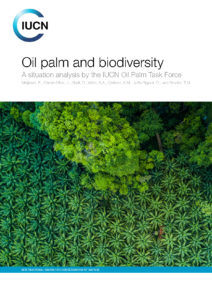 A report just published by the IUCN warns “Banning palm oil would most likely increase the production of other oil crops to meet demand for oil, displacing rather than halting the significant global biodiversity losses caused by palm oil”.
A report just published by the IUCN warns “Banning palm oil would most likely increase the production of other oil crops to meet demand for oil, displacing rather than halting the significant global biodiversity losses caused by palm oil”.
Palm oil is a word that inevitably comes up when talking about the effect that deforestation is having on the Sumatran tiger, orangutan and other endangered species. The debate on whether to promote the use of sustainable palm oil or avoid palm oil all together has been inconclusive but this study shows that avoiding palm oil will have a significant negative biodiversity impact due to the lower yield of alternative crops.
The study suggested that “by far the biggest gains for biodiversity in an oil palm context are through avoiding further deforestation”. What is unclear is whether the production of sustainably grown oil palm is yet having a positive impact on biodiversity as it is a still relatively new initiative.
1. Stronger government commitment in producing countries towards environmentally and socially responsible and just land use planning and land use, with a focus on halting deforestation and in line with their (international) commitments, including moratoria. This can be supported through partnerships between governments, civil society organizations, non-governmental organizations, producers, buyers and investors and banks;
2. Scientists to create an improved evidence base of in-situ certification effectiveness to continuously refine criteria to be more vigorous and effective in meeting environmental (and social) goals among highly variable production systems and groups of stakeholders;
3. The private sector to create more added value from certification by ensuring that producers deliver maximum gains to conservation (i.e. by preventing plantations expanding into forest frontiers), but also benefit financially through improved operational effectiveness and decreased costs, increased market share, and shareholder profit; certification needs to make business sense;
4. The private sector, non-governmental sector, governments and consumers to increase the adoption of standardized best practice (certified or otherwise well verified) across production zones, regardless of market or end use (i.e. export vs. domestic consumption);
5. The private sector, non-governmental sector, governments and consumers to increase consumption/demand of certified palm oil in underperforming markets (i.e. Indonesia China and India) to make sustainably certified palm oil the norm;
6. Stronger government commitment in consuming countries to exclude imports of irresponsible palm oil (e.g., by establishing a legal framework, public procurement with certified palm oil, etc) and support to producing countries to comply with these norms;
7. Stronger commitment and action of all supply chain actors and financial institutions to exclude irresponsible palm oil trade, consumption & financing from their business;
8. Private sector and government to make available green finance to further help protect and restore biodiversity in palm oil landscapes.

